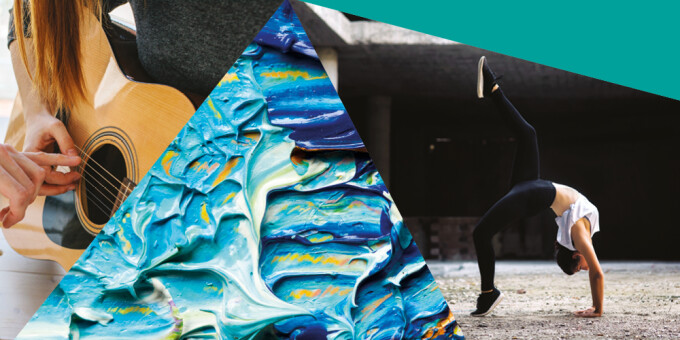The new version of the Expressive Arts Short Course launched last week and we’ve made a number of changes to the challenge content to make it more relevant and accessible for students working in all forms of expressive arts – from painting to poetry, crochet to circus skills, DJing to dance.
With news headlines lamenting the narrowing academic focus of the formal school curriculum, it is all too common to read reports of arts education being pushed aside. As someone with a very positive experience of arts in education, these stories are disappointing. Involvement in and appreciation of the arts can have huge benefits for young people. On a personal level it can provide a way for them to express themselves and their feelings, improve their mental health and wellbeing, encourage them to try new things and help them to connect with others. Arts education can also develop skills and qualities that are essential for learning, work and life – such as creativity, problem solving, openness to new experiences, communicating ideas, empathy and self-management.
The first four modules of the course encourage young people to follow the creative process of exploration, experimentation, development and reflection to find their own creative voice and produce their own original work. Challenges across all modules have been reworded to include a greater variety of expressive arts, including visual arts, performing arts, music, crafts and writing. A number of challenges have been amended to include references to social media and technology (eg digital arts) and to cover topics related to mental health and wellbeing.
The Short Course finishes with careers in the arts, the module that has changed the most in the course. ASDAN prides itself on offering courses with a clear line of sight to work and preparing young people for the modern world. A 2018 report by the Creative Industries Federation shows that the creative industries are the fastest growing part of the UK economy, contributing more than £100 billion in gross value added – this is greater than the automotive, aerospace, life sciences and oil and gas sectors combined. The updated content in the careers module more accurately reflects the wide range of careers in the creative industries. New challenges have been added with a focus on self-employment and freelance working, which is particularly common in this sector and increasingly common for young people entering the modern workforce.
This Short Course is packed with challenges that my 14-year-old self would have loved to do. It also covers content that none of my formal education experiences touched on but has been vital for my career in the creative industries. I took art and graphic products at GCSE, studied a BTEC in graphic design at college and my degree is in illustration – but I still didn’t know anything about how to file a tax return or promote my work on social media.
My five favourite challenges
Here’s my personal pick of challenges from the Expressive Arts Short Course, one from each module, to give a flavour of the updated course.
Module 1: Explore, section A, challenge 3
Start and maintain a thinking diary. Use this to keep ideas, notes, drawings, photos and experiments that relate to your expressive arts practice. Record your feelings, perceptions and dreams as well as your knowledge, process and use of techniques, instruments, tools and materials.
Module 2: Experiment, section A, challenge 8
Create a piece of digital music or art. Compare this with your experiences of producing music or art using non-digital techniques.
Module 3: Develop, section A, challenge 1
Create a piece of art using one or more art forms. For example: design and make an outfit; produce a collection of photographs on a particular theme; create a piece of mixed media art; produce a piece of music, video or animation; produce a book of creative writing or poetry; other. Keep a journal showing your activity and creative process, including research, experimentation, ideas, development and feedback.
Module 4: Reflect, section A, challenge 5
Find out how artists, musicians and other creatives use social media to share and get feedback on their work. As a group, discuss the positive and negative impacts of social media on creativity.
Module 5: Careers in the arts, section B, challenge 6
Research what is involved in setting up and running an arts business as a sole trader. Produce a guide that includes information on: company registration; accounts and tax; marketing; premises; insurance; support and advice.
